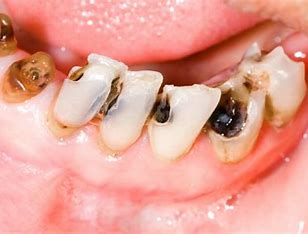
Dental caries, commonly known as cavities, are a form of tooth decay caused by bacterial infection.
Dental cavities are very common in Kenya among both children and adults due to high consumption of sugars, carbohydrates and sugary foods.
Development
Dental caries develop through a complex process:
- Bacterial Activity: Streptococcus mutants and other bacteria in the mouth convert sugars from food into acids.
- Acid Production: These acids demineralize the hard tissues of the teeth (enamel and dentin).
- Plaque Formation: A sticky film of bacteria, known as plaque, forms on the teeth.
- Cavity Formation: Over time, if the demineralization process continues without intervention, it leads to the formation of cavities.
Risk Factors
Several factors can increase the risk of developing dental caries:
- Poor Oral Hygiene: Inadequate brushing and flossing.
- Diet: High sugar and carbohydrate consumption.
- Dry Mouth: Reduced saliva production
- Fluoride Deficiency: Insufficient fluoride to help strengthen teeth.
- Genetics: Family history of dental problems.
- Age: Both children and older adults are at high risk.
Signs and Symptoms
- Pain with hot, cold or sweet foods or drinks
- Pain may be intermittent or severe, sharp and constant.
- A hole or black spot may be visible on any surface of a tooth.
Treatment
You can book a one on one with us on our website https://hellodaktari.co.ke and we shall be able to offer the necessary treatment. We also do offer Home based care services within Nairobi and its environs.
The treatment of dental caries depends on the severity of the decay:
- Fluoride Treatments: Early-stage decay can sometimes be reversed with fluoride.
- Fillings: Decayed portions of the tooth are removed, and the cavity is filled with materials such as composite resin, amalgam, or gold.
- Crowns: If a significant portion of the tooth is decayed, a crown may be placed to restore the tooth’s structure and function.
- Root Canals: If the decay reaches the pulp (innermost part of the tooth), a root canal may be necessary to remove infected tissue and save the tooth.
- Extractions: Severely decayed teeth that cannot be saved may need to be removed.
Prevention
Preventing dental caries involves several strategies:
- Oral Hygiene: Regular brushing with fluoride toothpaste and flossing.
- Dietary Changes: Reducing intake of sugary and acidic foods and drinks.
- Regular Dental Visits: Professional cleanings and check-ups.
- Fluoride Treatments: Using fluoride toothpaste and receiving fluoride treatments.
- Dental Sealants: Applying protective coatings on the chewing surfaces of the back teeth.
- Chewing Sugar-Free Gum: Stimulates saliva production, which helps neutralize acids.
Conclusion
Dental caries are a common but preventable oral health issue. Good oral hygiene, regular dental care, and a healthy diet are key to preventing cavities. Early detection and treatment are crucial to avoid more serious dental problems. If you have concerns about dental caries, reach out to us on https://hellodaktari.co.ke for personalized advice and care.
Top of Form
Bottom of Form
